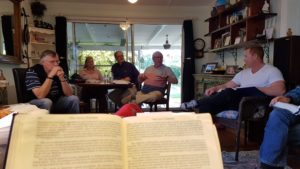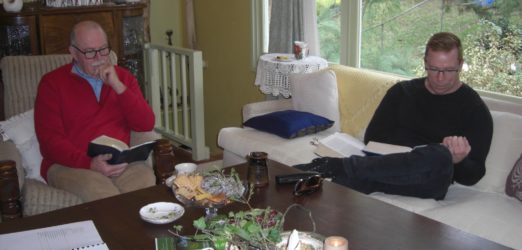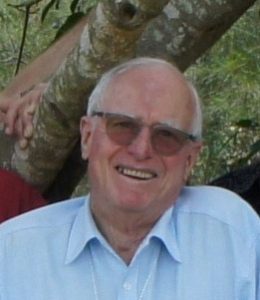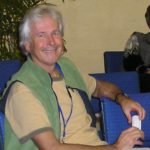© 2021 ANZURA, Australia & New Zealand Urantia Association

When ANZURA arranges a Study Day, the hope is to provide an opportunity for students of The Urantia Book to participate in a specially formed study group in their regional areas so that reads are meeting on the same day studying the same paper. The value of meeting with other readers is not to be underestimated—after all, our personal growth and religious experiences are best fostered while we are relating – inter-acting – with other personalities!
Groups met over the weekend of 19th June to study Paper 2: The Nature of God. The following articles contain some reflections from some who met.
¶ Hunter Region Meeting Reflections
Reflections by Marianne Cameron, Jim Neal, Andrew Swadling and Rita Schaad, Newcastle
The Revelators (in this case the Divine Counselors, the third in the group of Coordinate Trinity-Origin Beings) and a small group amongst 21 billion stationary Divine Counselors, assigned to function within the Universe of Nebadon, start by apologizing. Well, maybe not apologizing, but rather attempting to explain their inability to fully disclose to us the Nature of God.
They call the material at hand ‘poorly’, although they agree that the olden prophets did understand somewhat the eternal, never-beginning, never ending, circular nature of the Universal Father. Much that has been used in this paper from the old scriptures to describe God’s infinity, perfection, righteousness and love sounds awfully good to us.
…“How pure and beautiful, how deep and unfathomable is the supernal Ancestor of all things!”
“The Infinite is most excellent in that he imparts himself to men….” UB 2:1.2
…The Universal Father does not repent of his original purposes of wisdom and perfection. His plans are steadfast, his counsel immutable, while his acts are divine and infallible. UB 2:2.2
How futile to make puerile appeals to such a God to modify his changeless decrees so that we can avoid the just consequences of the operation of his wise natural laws and righteous spiritual mandates! “Be not deceived; God is not mocked, for whatsoever a man sows that shall he also reap.” UB 2:3.2
Over and over they say that their efforts to convey these high concepts are hampered by the limited capacity of our mind, the inadequate language to portray divine values etc. The revelators should know that we are awestruck with what they have come up with. Their efforts are totally appreciated!
Already in the introduction we read of Jesus of Nazareth! For us students of the blue book, taking the life of Jesus, here amongst us, as the backdrop – as a constant reference point – seems the best option for getting ahead in becoming more attuned to the Thought Adjuster and to understand the mind of Jesus by way of the Spirit of Truth.
It sounds kind of easy doesn’t it? We do have the account of his infancy, early childhood and right up to his travelling years as a young man. We can trace the growth of his mental self – how he thought, reasoned and made decisions – right up to reaching divinity status. We’ve got the tools…
One of our small group – Andrew – reminded us that Jesus did have – for the first time in his 7 bestowals – a Thought Adjuster. We pondered this for a while. The former bestowals differed from this one. Here he was starting out at the bottom of a creature’s life, and on top of that, as a “mere mortal” of an evolutionary planet. The consciousness of divinity had to dawn upon this human child very gradually. But the fact that this boy responded so quickly to the voice of the eternal Father within astounded us once more. How could we ever compete or compare with that?
In any case, we applaud the cheerfulness of the Divine Counselor with which he executed his mandate, like his way of ‘pulling us up’ by saying:
How unreasonable that you should not worship God because the limitations of human nature and the handicaps of your material creation make it impossible for you to see him……stop and ponder the solemn fact that God lives within you; he has in his own way already bridged the gulf. He has sent of himself, his spirit, to live in you and to toil with you as you pursue your eternal universe career. UB 2:5.6
And pursue our eternal career we will, keeping in mind the utmost importance at this time, to portray to the world such a balance in our daily lives that in addition to our moral mandates would point out…
….an equal consideration to the truths of science, philosophy, and spiritual experience, and to the beauties of the physical creation, the charm of intellectual art, and the grandeur of genuine character achievement. UB 2:7.9
Now wouldn’t that be fabulous!
That was another point that took us into discussing education, the various schools and their approaches and what we find could work best at this time. Also, that education in general of our younger generation always calls us to task by leading and modeling the better way.
Our group of four from the Hunter Region thoroughly enjoyed this day. The rain kept us inside and cozy, and the kindred spirit amongst us definitely encouraged us to go on our way with a renewed inspiration.

¶ Canberra Meeting Reflections
William Wentworth’s Reflections

One of the first statements made by the Divine Counselor is that the best guide we can have to the nature of God is our Creator Son’s revelation of the Father in his incarnation here on Urantia. This is the generalisation which we must bear in mind if we are to understand much about God.
There was also the reminder that God fully understands himself, and being infinite, is capable of meeting any need required of him.
However, this infinity of his nature requires that he must downstep his infinity and absoluteness in order to make contact with the creatures brought into being by the Creator Sons such as Michael of Nebadon and the hundreds of thousands of other Michael sons. Because fatherly love is the very nature of God, he wants to be in contact with these creatures who are all less than infinite, being finite or absonite.
He arranges for this necessary downstepping in many ways, the three most important from the creature perspective being:
- The Paradise Sons who create the local universes are close to the creatures they create, and even live among them in their bestowals, which are requirements of their acquiring sovereign status within their universes.
- He downsteps himself in the personalities of the Infinite Spirit so that these personalities can guide and assist mortals in their experience of evolution as they seek for truth, beauty and goodness. This is particularly true of the seraphim, the children of the local universe Mother spirit, who are only a little above mortal status, and who thus can understand us readily.
- In the bestowal of thought adjusters, pre-personal fragments of himself, God actually lives within our minds, always being subject to our personal will, but constantly attracting us to his perfection. And of course, once our growth has proved adequate, this same adjuster fuses with us, and our long path to God and Paradise is assured.
In pointing out the perfection of God the Divine Counselor reminds us that God is changeless. He knows everything and regrets nothing. It is therefore quite pointless for creatures to expect God to change in order to gratify some creature whim or other. God’s justice and his mercy are not contradictions. He knows we are imperfect, and thus make mistakes, but his justice maintains perfection, and his mercy is his response to imperfection. His love forgives us who make the mistakes, and his justice corrects the damage our mistakes have made – with those time lags concomitant with finite existence.
It was a little unexpected to find in one of the final paragraphs a criticism of the Hebrew religion. It is very instructive that this should appear in the paper about the nature of God. We are informed often in the papers of the object of a balanced existence consisting of the search for truth, beauty and goodness. The Divine Counselor regards the Hebrew religion as being unbalanced in that it promotes only goodness, while ignoring truth and beauty. To the extent that this unbalance carried over into Christianity, the loyalty of modern men has been substantially lost. The recovery of this balance may possibly attract some who consider themselves atheists to reconsider. Truth is beautiful and good, beauty is good and true, and goodness is true and beautiful.
When truth, beauty and goodness are blended in personality, the result is love conditioned by wisdom and qualified by loyalty. Almost sounds Godlike, doesn’t it?
Vern Verass’ Reflections

The nature of God is stated in the first paragraph and established as the parent-child relationship with all creatures gifted with personality. This fact is the foundation of faith.
The most profound manifestation of God – when God becomes a man – that man is Jesus.
…the most enlightening and spiritually edifying of all revelations of the divine nature is to be found in the comprehension of the religious life of Jesus of Nazareth… UB 2:0.2
Revelation teaches each of us that God has become one of us and has lived a mortal life as we all do, attained perfection to the exhaustion of the potentials of supremacy as is open to all who choose to live by faith in the Universal Father. Wholehearted consecration of will to the doing of the Father’s will – consecration of choice.
Faith most willingly carries reason along as far as reason can go and then goes on with wisdom to the full philosophic limit; and then it dares to launch out upon the limitless and never-ending universe journey in the sole company of TRUTH. UB 103:9.7
This paper endeavors to enlarge the reader’s human concept of God by employing the crude mechanism of word symbols, “…human word symbols certain ideas and ideals concerning the divine nature…” to gain registry in the reader’s mind. After all, the recognition response is dependent on lessening of resistance to the appeal of the indwelling spirit – an exercise of faith. The Divine Counselor acting by authority of the Ancients of Days on Uversa, who is the author of this paper is aware of mortal limitations – the attempt to impart truth to a creature of the lowest universe status with capacity to comprehend God – an animal-origin mortal – yet, still mostly animal in nature. The Divine Counselor frankly states,
…efforts to enlarge the human concept of God would be well-nigh futile except for the fact that the mortal mind is indwelt by the bestowed Adjuster of the Universal Father and is pervaded by the Truth Spirit of the Creator Son… UB 2:0.3
… animal-origin peoples. Only once in his sevenfold career as a bestowal Son is a Paradise Michael born of woman as you have the record of the babe of Bethlehem. Only once does he live and die as a member of the lowest order of evolutionary will creatures. UB 21:4.3
In effect, what the content of this paper is saying, humble acceptance of sonship is a prerequisite to enlightenment:
“The kingdom of God is within you” was probably the greatest pronouncement Jesus ever made, next to the declaration that his Father is a living and loving spirit. UB 195:10.4
Upon such a basis the Divine Counselor cheerfully carries on with the attempt at enlightenment of the mind of the reader
“…I cheerfully undertake the execution of my mandate to attempt the further portrayal of the nature of God to the mind of man…” UB 2:0.3
What follows is illuminative of the following characteristics of the Divine nature:
Infinity of God
“…He is the beginning and the end, the Father of every good and perfect purpose.” “With God all things are possible; the eternal Creator is the cause of causes.” UB 2:1.2
Perfection of God
“…God is literally and eternally present in his universe of universes. He inhabits the present moment with all his absolute majesty and eternal greatness”. “The Father has life in himself, and this life is eternal life.” Throughout the eternal ages it has been the Father who “gives to all life.” “…The perfection of divinity and the magnitude of eternity are forever beyond the full grasp of the circumscribed mind of mortal man…”
This is the true meaning of that divine command, “Be you perfect, even as I am perfect,” which ever urges mortal man onward and beckons him inward in that long and fascinating struggle for the attainment of higher and higher levels of spiritual values and true universe meanings. This sublime search for the God of universes is the supreme adventure of the inhabitants of all the worlds of time and space. UB 1:0.6
Justice and Righteousness of God
“…The justice of the Universal Father cannot be influenced by the acts and performances of his creatures, “for there is no iniquity with the Lord our God, no respect of persons, no taking of gifts.”
Supreme justice is dominated by a Father’s love; therefore will justice never destroy that which mercy can save. Time to accept salvation is vouchsafed every evildoer. UB 54:5.3
God’s Mercy
“…Mercy is simply justice tempered by that wisdom which grows out of perfection of knowledge and the full recognition of the natural weaknesses and environmental handicaps of finite creatures…”
God’s Love
“…The experience of loving is very much a direct response to the experience of being loved. Knowing that God loves me…” “…God is love, but love is not God.
…The infinite love of God is not secondary to anything in the divine nature. UB 188:4.8
God’s Goodness
“…religion is a faith-trust in the goodness of God…”, “…in religion God must also be moral; he must be good. Man might fear a great God, but he trusts and loves only a good God…”, “…God as a father transcends God as a judge…”, “…The goodness of God rests at the bottom of the divine free-willness — the universal tendency to love, show mercy, manifest patience, and minister forgiveness…”
Divine Truth and Beauty
All truth — material, philosophic, or spiritual — is both beautiful and good. All real beauty — material art or spiritual symmetry — is both true and good. All genuine goodness — whether personal morality, social equity, or divine ministry — is equally true and beautiful. Health, sanity, and happiness are integrations of truth, beauty, and goodness as they are blended in human experience. Such levels of efficient living come about through the unification of energy systems, idea systems, and spirit systems. UB 2:7.11
Reading this paper has been an education
The real purpose of all universe education is to effect the better co-ordination of the isolated child of the worlds with the larger realities of his expanding experience. UB 2:7.12